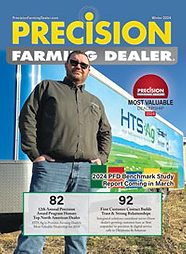Leslie Shalabi, Contributing Writer
Eight years ago, three companies joined forces to develop a robust RTK tower network throughout areas of North Dakota, South Dakota and Minnesota. This is unique because these three companies were actually competitive dealerships in the region.
The cast of characters includes three massive dealerships, all with locations in and around the Fargo, North Dakota area. They are:
- Butler Machinery Co., is a third generation, family-owned Caterpillar dealer, which also carries the Challenger brand of farm equipment, with locations throughout North Dakota, South Dakota and parts of Minnesota;
- RDO Equipment Co., an expansive John Deere dealership with 60 locations in nine states
- Titan Machinery, a Case IH, Case and New Holland dealership with 96 stores in eight states and 10 European dealerships in Romania and Bulgaria.
According to David Meyer, CEO of Titan Machinery, the principals at these dealers knew each other well through their involvement on industry boards and associations.
So it seemed natural that when precision farming first started taking off, that they would join forces to develop a tower network and essentially create a level playing field.
“This situation was like a railroad track,” Meyer said. “It made absolutely no sense to build three different tracks for three different trains all in the same area.”
Their goal from the outset was to put customer needs first and provide the highest quality, lowest cost signal that they possibly could.
These dealers acknowledged that they were in the business of selling and servicing agricultural equipment – not providing RTK signals. However, they also knew that it was in their best interest to offer a robust and reliable signal network so customers could take full advantage of the evolving precision farming systems.
As Meyer explains, coming together to develop the network was simply a good business decision for everyone involved.
|
"Rural Tower Network has nearly 400 farm entities using its network signals and that number continues to grow as does the number of tower locations …" |
“It made sense for us to pool our resources, share the risk and invest in a combined tower network,” he said. “The initial investment was high, since these towers had to be erected in 12 mile radiuses, so it worked well to share the cost and the risk in what was a relatively new technology at the time.”
One might think it a little sticky for competitors to join forces in this manner, but by all accounts it has been a smooth process.
A critical first step was to establish a completely separate legal entity under which the construction and business management of the tower network would be established. So in 2004, Butler, RDO and Titan Machinery established the Rural Tower Network. Each dealership has an equal stake in the ownership this company and each has a position on the board of directors.
Then they began investing in the construction of a network of 12 towers. And that network has grown exponentially in the last eight years. Rural Tower Network currently consists of over 90 towers and there are several more that are going to be built this spring.
Rural Tower Network technically owns all of the towers, and each individual dealership rents whatever towers they need. So for instance, if all three dealers have customers in a certain area, they would all three pay one third of the rent on the towers in that area. If only one dealer had customers in another area, they might pay 100% of the rent on those towers.
Then, the dealerships install their RTK equipment and sell the signal subscriptions to their individual customers. The dealerships apply the subscription fees they collect to their RTK equipment costs and their percent of rent paid on each of the towers.
They also made sure to hire a project manager from the outside to oversee everything. Kirk Johnson currently holds that position for the Rural Tower Network and he oversees the construction and maintenance of the towers. The dealerships are responsible for maintenance of the RTK equipment.
He reports to the board of directors of Rural Tower Network, which consists of one member from each of the dealerships involved.
“They work together to make joint decisions for the good of the network,” Johnson said. “And we have been very successful in being able to add more and more towers.”
It takes a certain number of customers to be able to support the financial decision to invest in a new tower, so having a customer base made up from owners of three different brands of farm equipment; they can reach the breakeven point much more quickly than competing signal companies in the area.
Rural Tower Network has nearly 400 farm entities that use its network of signals and that number continues to grow as does the number of tower locations.






Post a comment
Report Abusive Comment